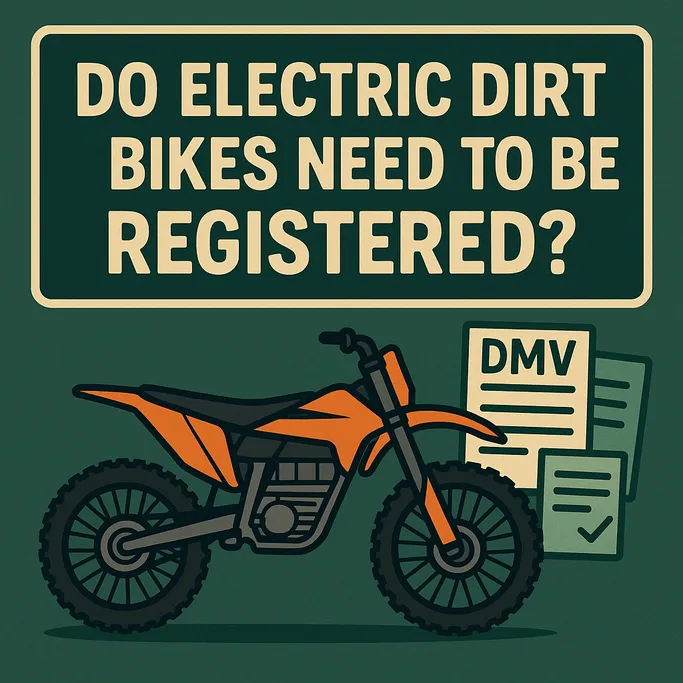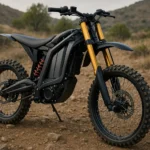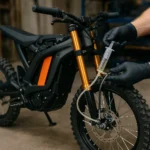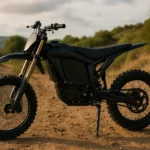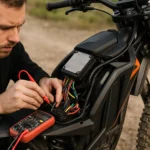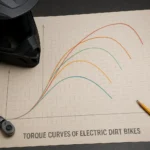If you’re asking “Do electric dirt bikes need to be registered?”, you’re not alone.
Many first-time riders are caught off guard when they realize their new e-dirt bike might need the same documents as a traditional motorcycle.
From VIN numbers to DMV paperwork, it’s not as simple as just hopping on and riding.
Depending on where you live, your electric dirt bike could fall under the same rules as gas-powered bikes—or be totally exempt.
That’s why knowing whether or not electric dirt bikes need to be registered is so important if you want to ride legally and avoid fines or confiscation.
In some states, registration for electric dirt bikes is required only if you’re riding on public roads.
In others, even off-road vehicles must be titled and registered through the DMV. If your bike has a VIN number and is classified as a motor-driven cycle, chances are you’ll need to file some paperwork.
👉 Before you end up at the DMV with the wrong documents (or none at all), read this full guide to answer your burning question: Do electric dirt bikes need to be registered?
And if you’re still unsure about street legality, don’t miss our full guide on electric dirt bikes and street laws.
Key Takeaways
- Electric dirt bikes may or may not need registration—depends on where and how you ride.
- Some models come with a VIN number—others don’t. That’s a huge deal.
- If you ride on public roads, registration is usually required.
- DMV rules vary state by state—and they love their red tape 🧾
- This guide tells you what to check before you hit the throttle! ⚡
⚠️ What You’ll Learn in This Guide: Skip to the part that matters most using the quick links below 👇
What Counts as a “Registerable” Electric Dirt Bike?
So, do electric dirt bikes need to be registered like gas-powered motorcycles? Well, it depends—big time.
The key factor is how your bike is classified.
States typically separate vehicles into on-road and off-road categories, and your dirt bike’s classification determines whether it’s subject to registration laws, insurance requirements, and vehicle inspections.
If your electric dirt bike is being used strictly for off-road adventures on private property, there’s a good chance you won’t need to register it.
But as soon as you plan to ride on public streets—even for a short stretch—DMV rules kick in.
That’s when the big question resurfaces: Do electric dirt bikes need to be registered for road use? In most cases, yes.
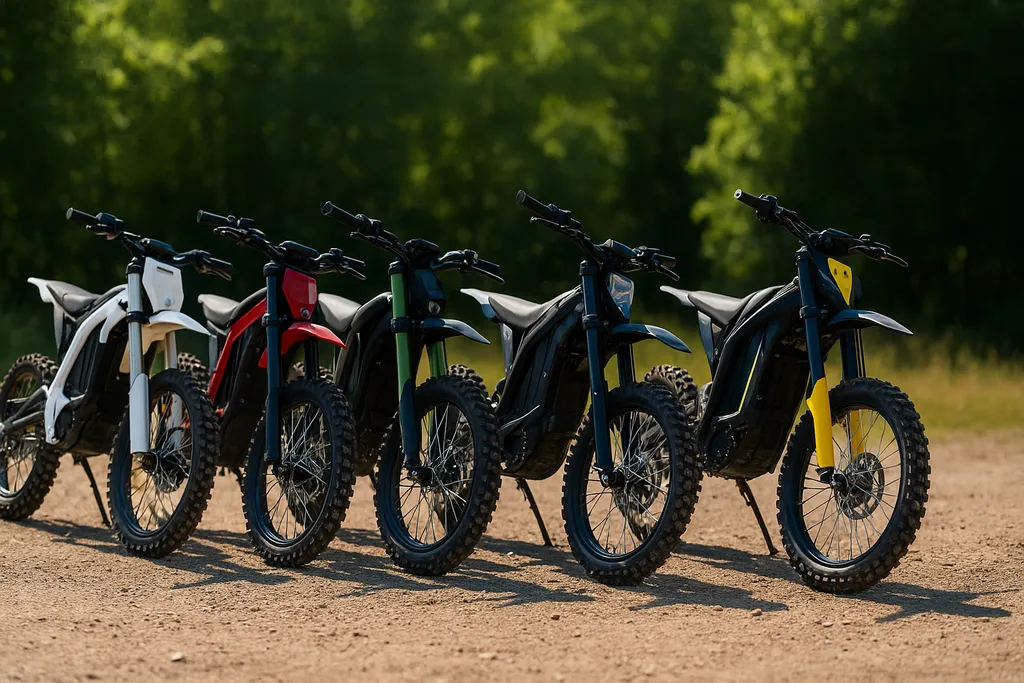
Understanding Street vs Off-Road Classification
An off-road only electric dirt bike doesn’t need to be street legal—and usually skips the DMV process.
These models are often sold without turn signals, headlights, mirrors, or other required DOT-approved components.
But when you modify or upgrade your bike for urban use, it shifts into a different legal zone.
Want to ride through your neighborhood or take a shortcut across a paved road? That changes everything.
Suddenly, the need to register electric dirt bikes becomes real—and unavoidable.
Examples of Registerable vs Non-Registerable Models
Let’s break it down with a few common models:
- Sur-Ron Light Bee X – Borderline. Some come with a VIN and can be registered depending on your state’s rules.
- Razor MX650 – Non-registerable. It’s a low-speed recreational bike intended for kids, with no VIN or road capability.
- Segway X260 – Conditional. With upgrades, it may qualify for registration, especially if it has a VIN and meets DOT specs.
These examples show just how messy the question “Do electric dirt bikes need to be registered?” can get.
It’s not just about the bike—it’s about where, how, and why you ride it.
That’s why it’s crucial to check with your local DMV or transportation authority before hitting the road.
Otherwise, you could end up riding dirty without even knowing it 😬.
The VIN Dilemma: What If My Bike Doesn’t Have One?
Here’s where things get tricky. One of the biggest factors in answering “Do electric dirt bikes need to be registered?” is whether your bike has a VIN—a Vehicle Identification Number.
No VIN? No easy registration. This 17-character code is like your bike’s fingerprint, and without it, the DMV may not even let you start the paperwork.
Some electric dirt bikes—especially cheaper models or those made strictly for off-road use—are sold without any VIN.
And that’s a major red flag if you’re hoping to get it titled or ride it on public roads.
Why VIN Numbers Matter for Registration
DMV systems rely on VINs to track vehicle history, ownership, safety recalls, and legality.
If your electric dirt bike doesn’t have one, the question “Do electric dirt bikes need to be registered?” becomes moot—because you can’t even begin the process.
Even if your state allows off-road registration, a VIN is often still required. Without it, your bike might be classified as a toy or recreational device, which can limit its use severely. 🧸
How to Check If Your Bike Has a VIN
To find the VIN, look for a metal plate or engraved number near the steering tube, bottom bracket, or rear swingarm.
It should be 17 characters long and include both letters and numbers. If you can’t find it—or the number seems incomplete—it’s time to contact the manufacturer or seller.
Here’s a quick checklist:
- ✅ Is it 17 characters long?
- ✅ Is it located in a typical VIN spot?
- ✅ Is it stamped or etched into metal?
- ❌ Is it a sticker that can peel off? (That’s not legit.)
If your bike passes the test, you can move forward confidently. If not, you may be stuck.
That’s why one of the most overlooked answers to “Do electric dirt bikes need to be registered?” is: Only if they’re built like a real vehicle.
Bottom line? No VIN = no registration. And without registration, forget about riding legally on public streets.
Title and Documentation: Do You Need a Motorcycle Title?
Now that you’ve checked for a VIN, let’s move to the next big question: Do electric dirt bikes need to be registered with a title, like traditional motorcycles?
The short answer is—sometimes. But the long answer depends on your state, your bike’s classification, and whether you’re riding on or off the street.
A title is an official document proving ownership of a vehicle. It’s not the same as registration, but the two often go hand in hand.
You may need a title before you can even begin the registration process at the DMV.
Difference Between a Title and Registration
Let’s clear this up real quick:
- Title = Ownership document 📜
- Registration = Permission to ride legally on public roads 🚦
A lot of people confuse the two. But when asking “Do electric dirt bikes need to be registered?”, understanding this difference is key.
You could technically own your bike (have a bill of sale) but still be riding illegally if it’s not registered properly.
Getting a Title for an Electric Dirt Bike
Not all electric dirt bikes come with a title—especially if they’re imported, off-brand, or sold as recreational vehicles.
If you bought your bike from a major retailer or a local dealership, they should have included a Manufacturer’s Certificate of Origin (MCO).
This acts as a pre-title and can be used to apply for a real one.
Here’s what you’ll likely need:
- ✔️ MCO or bill of sale
- ✔️ Valid ID
- ✔️ VIN verification (if applicable)
- ✔️ Proof of tax paid or invoice
Without a title, you might not be able to register your bike—bringing us right back to the main question: Do electric dirt bikes need to be registered?
Yes, if you want to be road-legal, and having a title is a big part of making that happen.
And hey, if your bike doesn’t qualify for a title, don’t panic just yet—we’ll cover workarounds and state-specific exceptions later on.
How Registration Works for Electric Dirt Bikes (By State)
So, you’ve got a VIN and maybe even a title. Now comes the real kicker—do electric dirt bikes need to be registered in your specific state?
Spoiler: there’s no national rulebook. Every state has its own DMV requirements, fees, loopholes, and fine print. 🧾
While some states treat electric dirt bikes like traditional motorcycles, others are more lenient—especially for off-road-only models.
The key is knowing where your ride will be used and how your state defines “motor vehicles.”
🔥 5 States With Strict Rules
Let’s look at states where the answer to “Do electric dirt bikes need to be registered?” is almost always yes:
- California – Requires registration for any vehicle operated on public roads. Even off-highway vehicles (OHVs) must be registered with a green or red sticker.
- New York – Treats most electric dirt bikes as motorcycles or mopeds. You’ll need a title, insurance, and plates if you’re hitting the streets.
- Texas – Requires full DOT compliance for on-road use. Most electric dirt bikes must be converted and pass inspection before registration.
- Florida – Allows some low-speed e-bikes, but dirt bikes with motors are often classified as motorcycles, needing full registration.
- Pennsylvania – Enforces registration for all motor-driven cycles on public land. Title and insurance are also required.
In all of these states, the question “Do electric dirt bikes need to be registered?” isn’t just a maybe—it’s a must.
Where It’s Easier (and Cheaper)
Other states are a bit more chill:
- Arizona – Allows off-road registration and street-legal conversion with fewer headaches.
- Nevada – Offers a separate OHV registration that’s simpler and doesn’t always require inspection.
- Colorado – Mostly off-road-friendly, with optional street registration if your bike meets safety criteria.
These states recognize the rise in electric dirt bikes and offer clearer paths to legal riding.
Want official definitions and classifications? Check out the NHTSA Vehicle Types Guide for clarity on what your bike may be considered under federal standards.
As you can see, the answer to “Do electric dirt bikes need to be registered?” isn’t one-size-fits-all. But knowing your state’s stance is half the battle.
What the DMV Wants From You: A Simple Checklist
You’ve figured out your bike’s classification, checked for a VIN, and maybe even got your title.
Now it’s time to face the real gatekeeper: the DMV. If you’re still wondering “Do electric dirt bikes need to be registered?”, the DMV is where that question gets answered—with paperwork.
Lots of it. 😅
Most DMV offices require similar documentation to register any motor-driven cycle, including electric dirt bikes.
The more prepared you are, the smoother (and quicker) the process.
Documents You’ll Need for Registration
To save yourself from an extra trip (or two), bring these:
- 📄 VIN verification form (if required in your state)
- 🧾 Bill of sale or proof of purchase
- 📋 Manufacturer’s Certificate of Origin (MCO) or current title
- 🪪 Government-issued ID (driver’s license or ID card)
- 📑 Proof of insurance (if riding on public roads)
Each of these documents plays a role in confirming that your electric dirt bike is roadworthy, legal, and actually yours.
Still asking yourself “Do electric dirt bikes need to be registered?”? If your DMV is asking for this much proof, the answer’s probably yes. ✅
Bonus: Ask These Questions Before You Go
Call ahead or check your DMV’s website and ask:
- Does my bike fall under motor-driven cycle or off-road vehicle?
- Is a safety inspection required before registration?
- Can I register online, or do I need an appointment?
- What’s the total cost for registration and plates?
- Can I register an electric dirt bike without a VIN?
Having these answers in advance will make your DMV visit less painful—and get you closer to a legal ride.
In most states, if the DMV requires these documents, then yes—electric dirt bikes need to be registered just like any gas-powered motorcycle.
Riding Without Registration: What Could Happen?
Here’s the cold, hard truth: if you skip registration, you’re taking a big risk.
Still wondering “Do electric dirt bikes need to be registered?” Well, if you’re planning to ride on public roads without it—you could be in for a nasty surprise. 😬
Just because your electric dirt bike is silent and eco-friendly doesn’t mean it’s immune to the law.
Most states treat unregistered motor-driven vehicles exactly the same, whether they run on gas or lithium-ion batteries.
Real Risks of Ignoring the Rules
If you ride an unregistered electric dirt bike in areas where registration is required, here’s what could happen:
- 💸 Fines – You could be slapped with a ticket that’s more expensive than the bike itself.
- 🚔 Bike Confiscation – Cops might impound your ride on the spot.
- 📉 Points on Your License – In some states, violations are tied to your driving record.
- 💢 Repeat Offender Penalties – More tickets = higher fines and possible court appearances.
You bought your bike for freedom and fun, not legal headaches. The easiest way to avoid all this? Know the law.
If your DMV says electric dirt bikes need to be registered, get it done.
Common Myths (and Why They’ll Get You in Trouble)
Let’s bust a few myths that get riders in hot water:
- “It’s electric, so it doesn’t count.”
Wrong. The DMV doesn’t care what powers it—just how and where it’s used. - “It’s just a toy.”
If it goes over 20 mph or has a throttle, it’s not a toy in the eyes of the law. - “Nobody enforces these rules.”
Until they do—and then it’s too late.
These myths keep circulating in forums, but believing them could cost you big. Always verify with your state laws.
Because if you’re asking “Do electric dirt bikes need to be registered?”, it means you care—and that’s the first step to riding smart.
7 Tips to Stay Legal (And Avoid DMV Headaches)
We’ve covered the big question—do electric dirt bikes need to be registered—from every angle.
Now let’s make sure you actually stay on the right side of the law. These tips will help you ride confidently, dodge trouble, and handle the DMV like a pro. 🏁
Whether you’re just cruising the neighborhood or planning longer rides, these practical moves will save you time, money, and migraines.
1. Always Check Your State’s DMV Website
Rules vary by location, so don’t assume what applies in California also applies in Ohio.
Look up the latest info on electric vehicle classification, title requirements, and registration procedures. Better safe than sorry.
2. Keep All Purchase Documents Safe
That means saving your bill of sale, receipt, and any paperwork that shows where, when, and how you bought your bike.
You’ll need these if the DMV asks for proof of ownership—or if you ever sell it.
3. Ask the Seller About VIN and Title Before Buying
This is huge. If you buy a bike with no VIN or MCO, your odds of registering it legally drop fast. Always ask upfront:
“Can this electric dirt bike be registered in my state?”
4. Avoid Suspicious or Unknown Brands
Sketchy sellers often import bikes with no VIN or DOT approval. If the price looks too good to be true, it probably is. Stick with trusted brands like Sur-Ron, Segway, or Talaria.
5. Consider a Street-Legal Conversion—If Allowed
Some states let you convert off-road bikes for street use. You’ll need mirrors, DOT lights, a horn, and other components. Make sure your state allows this before you invest in upgrades.
6. Keep DMV Contact Info Handy
Trust us: you’ll probably have a question or two. Having a direct number to your local DMV saves time. You can often clarify things in five minutes with a phone call.
7. Revisit Our Legal Guide for Extra Backup
Still unsure? Head back to our full post:
👉 Are Electric Dirt Bikes Street Legal?
It breaks down the laws by region and gives more examples of what’s allowed—and what’s not.
In short, if you’re asking “Do electric dirt bikes need to be registered?”, it means you care about doing things right.
These seven steps will help you avoid mistakes and make the most out of your electric ride.
FAQs – Real Questions from Riders Like You
Still scratching your head over the whole “Do electric dirt bikes need to be registered?” thing?
Don’t worry—you’re not the only one. Here are some of the most common questions we get from riders trying to navigate the paperwork maze.
Let’s clear things up once and for all. 🧠
Do electric dirt bikes need to be registered in California?
Yes. California is one of the strictest states when it comes to motorized vehicles. If your electric dirt bike is used off-road, you’ll likely need a green or red sticker.
For street use, full registration, insurance, and DOT compliance are required.
Can I register my electric dirt bike without a VIN?
In most cases, no. The DMV requires a VIN to identify the bike and tie it to you legally.
Some states allow you to apply for a new VIN, but the process can be slow and complicated.
What happens if I ride without registration?
If your state requires it, riding without registration could result in fines, your bike being impounded, or even points on your license.
And no, being electric won’t get you off the hook.
Is a bill of sale enough to prove ownership?
Sometimes. A bill of sale is useful, but most DMVs will still ask for a Manufacturer’s Certificate of Origin or previous title to process full registration.
Do kids’ electric dirt bikes need to be registered?
Usually not—if they’re under a certain speed threshold (like 20 mph) and are used on private property.
But check local rules. In some areas, even low-speed models need basic documentation.
Can I register an imported electric dirt bike?
It depends. If the bike doesn’t meet DOT safety standards or lacks documentation, the DMV may reject your registration.
Always research before importing.
Do electric dirt bikes need to be registered if I only use them off-road?
In many states, yes. Off-road registration (like OHV tags) is still required to use public trails or parks—even if you never touch a paved road.
All of these questions boil down to one thing: Do electric dirt bikes need to be registered in my situation?
The answer depends on your bike, your state, and your intended use. So always double-check the rules before you ride.
Let’s Keep the Ride Going – Share, Comment, and Help Others Stay Legal
If this guide helped answer your big question—“Do electric dirt bikes need to be registered?”—then chances are it’ll help someone else too. 🚀
We built the Electric Dirt Zone community so riders like you (and parents, too!) can stay informed, ride safe, and dodge legal headaches before they even begin.
👉 Share this post with your riding crew, tag us on socials, or drop a comment below if you’ve been through the DMV process yourself.
Your story might save another rider from a massive fine (or worse).
And if you’re still unsure whether your bike is road-legal, be sure to check out our ultimate guide on street legal electric dirt bikes. It connects all the dots.
Together, we ride smarter. ⚡💬

Tyler Brooks is the storyteller behind most of the content at Electric Dirt Zone. With over 10 years of experience in digital media and a lifelong love for off-road riding, he blends technical insight from the team with engaging, down-to-earth writing. When he’s not turning dusty trail rides into blog posts, you’ll probably find him snapping pics before things get too wild.

